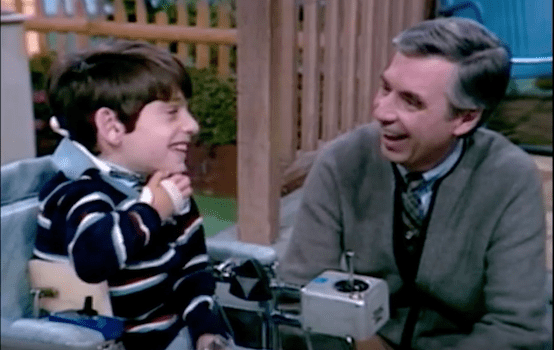Mister Rogers’ Ministry

Some days, one longs for a psychological respite from the endless noise and drama that is American public life. Morgan Neville’s warm-hearted documentary remembrance of Fred Rogers, Won’t You Be My Neighbor?, is exactly that.
As one might expect, Neighbor is a gentle, pleasant movie that captures the kindness of its subject. Through a mixture of film clips and interviews, Neighbor canvasses the long arc of Rogers’ career, from his first foray into black-and-white children’s television to his final onscreen appearances in the early 2000s. (In one of the film’s more surprising moments, I learned that Rogers—a Presbyterian minister by training—was ordained specifically for ministry through television. I couldn’t help being reminded of the Reformation’s doctrine of vocation.)
In the 1950s, when Rogers first began working in television, children’s shows heavily relied on lowbrow slapstick comedy. Rogers found this appalling. In his mind, children needed programming that spoke to their developmental needs, not content that merely pandered to their instincts. And chief among those developmental needs, Rogers believed, was love and compassion.
Thus began Mister Rogers’ Neighborhood, the simple yet groundbreaking children’s show that entertained millions. And as we learn, the show forayed into surprisingly complex territory, alluding to topics as charged as the Vietnam War, the RFK assassination, and the Civil Rights Movement. While Rogers would eventually go on to try his hand at TV programming for adults, his first love was always children’s shows—which undoubtedly constitute his greatest legacy.
Happily, there’s nothing here that calls Rogers’ ethics or personal morality into question. Indeed, interviews with Rogers’ family members and onscreen collaborators reveal a remarkable continuity between his onscreen and offscreen personalities. Hard as it may be to believe, given today’s climate of cynicism, it seems that Mister Rogers really was just that nice.
But it’s worth noting that Rogers’ career was not without its critics. In particular, Rogers has lately been accused of fostering attitudes of entitlement and excessive self-confidence—a “participation trophy culture.” As writer Jeffrey Zaslow put it in a 2007 Wall Street Journal article, “what often got lost in his self-esteem-building patter was the idea that being special comes from working hard and having high expectations for yourself.”
Perhaps. I’m not sure, though, that that’s an altogether fair take.
Towards the film’s end, we learn that in Rogers’ final weeks of life, he mused aloud “Am I a sheep?”—a reference to the Parable of the Sheep and Goats in Matthew 25:31–46. In context, the moment comes off as sadly humorous: as his family reminds us, if anyone was a sheep, it was Mister Rogers.
On a deeper level, though, such a musing reflects an essential difference between Rogers’ approach to human dignity and contemporary defenses of relativistic moral autonomy. The parable speaks of a transcendent standard against which our conduct must ultimately be measured; human beings are indeed valuable in themselves, but never become independent arbiters of right and wrong. That judgment rests outside ourselves.
It’s this crucial theological insight—the distinction between unconditional love and indiscriminate affirmation—that Rogers’ “participation trophy” critics perhaps have difficulty grasping. That’s a shame, because although it’s an insight that’s easily forgotten, it’s an essential one. And denouncing any talk of unconditional love as mere “entitlement mentality” implies that the value of persons is defined solely by their useful capacity—a grimly utilitarian ethic indeed.
A more interesting question, in my mind, arises from the essential premise of Rogers’ work: that what children crave most is an environment of safety and support—a kind of buffer against the darkness and stresses of the world. Perhaps my childhood tastes ran in a more baroque direction, but the tales that really mesmerized my young mind were stories of unflinching good and evil—Moby-Dick, the Count of Monte Cristo, the Three Musketeers, Robin Hood, and so forth. (There’s a reason Grimm’s Fairy Tales have remained perpetually popular.) Unsettling and disturbing? Maybe. But at the same time, those stories speak of enduring hope in the face of darkness, even when order, consensus, and harmony are nowhere to be seen. They urge us to go on “carrying the fire,” to use Cormac McCarthy’s phrase. Tranquility and calm are certainly valuable—but what happens when the world doesn’t feel much like Mister Rogers’ Neighborhood?
Neighbor doesn’t probe that question—nor does it really need to. As a window into the life of a kind man who made the world a warmer place, it succeeds beautifully. And maybe, in a season of massive polarization, that makes it exactly the film we need. The world of new media certainly awaits a new, and doubtless very different, Mister Rogers.
Most of all, no matter our backgrounds, in Rogers’ story we can glimpse something truly essential: what it really means to live—and die—well.
John Ehrett is executive editor of Conciliar Post and a graduate of Yale Law School.
Comments